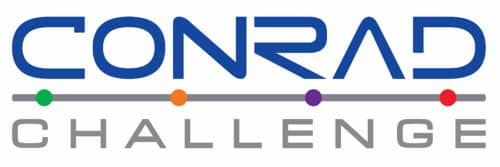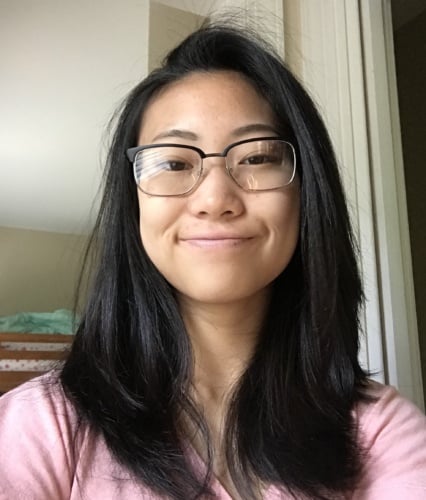High school student Sarah Wang is a two-time participant in the Conrad Challenge, an innovation and entrepreneurship competition for teams of students ages 13-18 that annually attracts hundreds of teams from dozens of nations. Through participating, students develop the skills for 21st century workforce success and go through the steps to launch commercially-viable innovations that have the potential to change life for the better on the individual, national and global levels.
In this quick Q&A, Sarah shared some of her insights from the last two Challenges. Her responses give other students, as well as their educators, a perspective on the innovation process.
Although registration has closed for student teams for the 2019-20 Conrad Challenge, there are still great opportunities for educators and industry professionals to get involved by becoming a judge or working with students as a subject matter expert.
Q: Tell us about how you first got started with your innovations in each year of the Conrad Challenge. How did your team work together to determine the global challenge you were interested in solving? Did you do specific research to learn more about it?
Sarah Wang: I first got started with the Conrad Challenge when I was a freshman in high school. My sister had previously participated and suggested we participate together. At first, I was very apprehensive, but as we did more research into what we wanted to look into, I found more and more issues that I personally wanted to change. That’s how we figured out what we wanted to focus on. Last year, when I was a sophomore, I participated again in the Conrad Challenge, but this time with a classmate. Now, I’m a high school junior and as I look back upon my last two years participating in the Challenge I see how much I’ve learned – whether it be about how to write a report, researching a topic, or how coordinate with a team – through my participation.
Q: In your experience, what is the most difficult part of getting started with a new invention? What advice would you have for other students to get past this?
SW: The most difficult part of getting started was trying to keep our invention realistic. It’s easy to let your imagination overrule your rational mind, but it’s important to keep in mind the fact that without realism, it’s impossible for your invention to be successful.
Q: What educators or other advisors did you work with during your two years in the Conrad Challenge? What was the most valuable support they provided?
SW: We worked with researchers from our local university, Duke University, as well as farmers around the North Carolina Piedmont area. The most valuable support they provided was that they were able to offer us insight into what the demographic was like, as well as what life is really like for these people. This helped us further understand our sales demographic, which thoroughly helped us build our business plan.
Q: What are the most important steps for taking an invention from just an idea, and developing it into a real, marketable product?
SW: The most important steps for transforming an invention into a realistic product are 1) to put yourself out there and 2) to ensure that you understand your market. Another important step is to ensure that you understand your producers are on board with your idea and ensure they fully understand the internal works of the product.
Q: What did you learn about entrepreneurship and innovation that you think every student should have a chance to learn?
SW: The biggest thing I learned about entrepreneurship is that the people you are pitching are really passionate about what they do, so they will take you completely seriously. Your demographic is also extremely invested, so it’s important to be as passionate and motivated as your producers, demographic, and more. I found that the importance of the maintaining of your passion can be applied to all subjects and projects you’re working on, and only serves to make things better.

Author
 Sarah Wang is currently a junior at Enloe High School in Raleigh, North Carolina. Sarah participated in the 2017-2018 and 2018-2019 Conrad Challenge, going to the Summit both times and winning the PowerPitch during the 2018-2019 year. Her team names/inventions were “Transbacco” and “Tobbaco-cide”. Both inventions focused on using tobacco as a primary source; however, “Transbacco” focused on genetically modifying the tobacco plant to produce a certain enzyme while “Tobacco-cide” focused on finding a unique, effective way to repurpose tobacco.
Sarah Wang is currently a junior at Enloe High School in Raleigh, North Carolina. Sarah participated in the 2017-2018 and 2018-2019 Conrad Challenge, going to the Summit both times and winning the PowerPitch during the 2018-2019 year. Her team names/inventions were “Transbacco” and “Tobbaco-cide”. Both inventions focused on using tobacco as a primary source; however, “Transbacco” focused on genetically modifying the tobacco plant to produce a certain enzyme while “Tobacco-cide” focused on finding a unique, effective way to repurpose tobacco.Further Reading
- Bundabergnow – Challenge sends students to Kennedy Space Centre
- edCircuit – Nancy Conrad to Receive Prestigious 2019 Intellectual Property Champion Award from U.S. Chamber of Commerce
- edCircuit – How Students Combine Entrepreneurship and STEM to Solve Global Challenges
